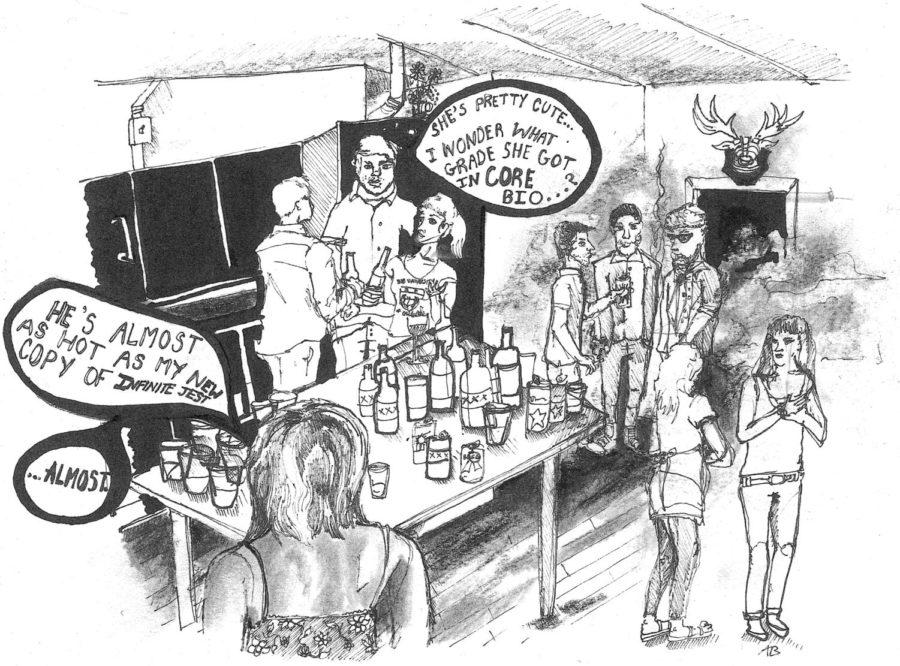I have often heard friends who attend other universities refer to the sex or dating culture on their campuses. They usually say something about the “hook-up culture,” or the “you’re-married-or-single culture.” Indeed, college manuals and Web sites for prospective students often include whole sections about what sex and dating are like on campus. I myself asked the same questions when I was a prospective student at the University of Chicago. However, four years later, if someone were to ask me to describe the sex culture at UChicago, I am not sure that I would have a ready answer. Accordingly, I decided to investigate the issue and determine if, first and foremost, we have a sex culture, and if we do, what it looks like.
I spoke with third-year Eve Hupert, an international student in a sorority, about her understanding of UChicago’s sex culture, which she described as “mostly unacknowledged.” She described herself as “traditional” in comparison to some of the more “liberal” students on campus. “Students here take their studies or careers very seriously, but sometimes think, oddly, that relationships are below them.” She emphasized the importance of considering one’s reputation while deciding who to hook up with and who to date, especially in the Greek system, where according to her, “everyone knows everyone.”
I spoke with fourth-year Danny Rosa, a gay fraternity brother, about his experiences on campus. Although Rosa’s mixture of identities might make him seem like an enigma, he is actually writing his senior thesis on the topic of gay fraternity brothers, and says that at UChicago they number in the double digits. Interestingly, his sexual orientation has never posed a problem for him in his fraternity, but the Greek system’s treatment and name-calling of sexual women and men has often made him uncomfortable. Rosa, a transfer student from California, said that his initial understanding of sex and dating culture was at odds to that of UChicago. “People have a really negative view of hooking up here. I don’t understand it,” Rosa said, describing students as, “relationship-oriented,” in a way he hadn’t experienced before. “I really wish there wasn’t this stigma against hooking up. Not everyone falls under the relationship paradigm. Keep an open mind,” Rosa said.
Fourth-years Erika Dunn-Weiss and Rachel Sullivan, two of the founders of Tea Time and Sex Chats, an RSO with the aim of creating a comfortable environment for students to learn about and discuss sex, discussed their experience and understanding of UChicago sex culture, described by Dunn-Weiss as “curious.” They explained that they originally applied for money through the Uncommon Fund, but were aggressively turned down. Since then, the campus community has been highly supportive, financially and otherwise, of the program. “Everyone deserves a space where they can talk about sex that isn’t their doctor’s office or health class,” Sullivan said. They hold sessions every other week on sex topics like “Sex for First-Timers” and “Oral Sex,” which 70 students attended each time it occurred. They explained that UChicago students do not want to appear ignorant about any topic, especially sex. However, “just because you got into UChicago, doesn’t mean you learned sex ed,” Dunn-Weiss said. (Tea Time and Sex Chats’ next session is May 1 at 7:30 in Harper 140. RACK [Risk Aware Consensual Kink] will be presenting “BDSM for Beginners.”)
Dunn-Weiss and Sullivan also started the University of Chicago Clothesline Project, which will be displayed in Hutch Courtyard Memorial Day weekend. The Clothesline Project documents instances of sexual assault through T-shirts designed with the stories of survivors or the family or friends of survivors. They decided to start the project because of the reinvigorated discussion about sexual assault on campus in response to the Amherst case and article. The main response to the article and to the Clothesline Project is “it wouldn’t happen at UChicago,” Dunn-Weiss said. The 27 shirts directly dispute this misconception, as well as “offer people who shared their stories a transformation that is striking,” said Sullivan. Sullivan and Dunn-Weiss said that the Clothesline Project remains separate from the “curious” sex culture of UChicago. “There is not the same curiosity about understanding sexual assault,” said Dunn-Weiss.
Perhaps people don’t refer to UChicago’s sex culture by a catchy moniker because there is no unifying, definable sex culture here. Like students everywhere, UChicago students are constantly striving and failing to become responsible adults not only professionally, but also in their romantic relationships. Unlike students everywhere, they may think that the best way to lead to a sexual encounter is to, say, demonstrate their deep knowledge of Wittgenstein. Second-year Rebecca Stoner explained, “All students here share underlying features, such as intellectual curiosity; however, they all belong to different subgroups that have their own subcultures and, accordingly, their own unique sexual cultures.” She added, “It is a matter of scale. In a population of 5,000 students there is room for a lot of cultures… UChicago has a surprisingly strong dating culture.”









